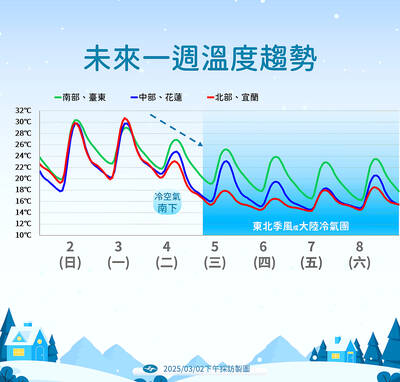The Pentagon is becoming increasingly alarmed by Chinese fishing vessels harassing US intelligence-gathering ships.
While senior officials have played down the incidents in public, the US State Department has launched a behind-the-scenes diplomatic push to persuade Beijing to stop the dangerous tactic before it gets out of hand.
The concern is that if the incidents continue, a serious clash could happen — potentially costing lives and resulting in an international crisis.

PHOTO: AP
The latest confrontation, the fourth in a month, occurred on Friday when two Chinese-flagged fishing boats came within 30m of the USNS Victorious in an “unsafe and dangerous” fashion, the Pentagon said in a statement on Tuesday.
China said yesterday the US vessel violated maritime law and urged the US to take steps to avoid a repetition.
US officials said the incident lasted about an hour and the unarmed Victorious, which is equipped with state-of-the-art scientific equipment to map the ocean floor and track submarines, sounded its alarm and shot water from its fire hoses.
But the fishing boats did not leave until the Victorious radioed a nearby Chinese military ship for help, Pentagon spokesman Bryan Whitman said.
He said the US vessel was conducting “routine operations” in the Yellow Sea and was in international waters.
After incidents in March that included similar but more aggressive Chinese maneuvers, the Pentagon protested to Beijing and issued a strong public statement calling the Chinese actions harassment.
But this week Whitman refused to characterize the Chinese actions and appeared to play them down.
“We will be developing a way forward to deal with this diplomatically,” he said when asked why the tone of his initial reaction was muted.
In its statement, the Pentagon said the “USNS Victorious was conducting routine operations on Friday, May 1, in international waters in the Yellow Sea in accordance with customary international law, when two Chinese fishing vessels closed in on and maneuvered in close proximity to the Victorious. The intentions of the Chinese fishing vessels were not known.”
The statement added that the Victorious radioed the WAGOR 17 Chinese government ship, which came and shone a light on one of the fishing vessels. Both of the fishing vessels then moved away.
“WAGOR 17 took positive steps, pursuant to their obligation under Article 94 of the UN Convention of the Law of the Sea, to ensure their flagged vessels navigate safely,” the statement said.
All of the incidents this year took place in a disputed band of water far off the Chinese coastline but within what Beijing considers a 320km economic zone under its control. Under international law, the zone gives a state certain rights over the use of natural resources.
The Chinese position clashes with the cardinal principles of the US doctrine of ocean navigation — the right to unrestricted passage in international waters as long as vessels are not encroaching on the economic interests of the country they pass.
But China’s Foreign Ministry said yesterday: “The US surveillance vessel USNS Victorious violated relevant international laws and Chinese laws and regulations by entering into China’s exclusive economic zone in the Yellow Sea without China’s approval.”
“The Chinese side expresses its concern and has demanded that the US side take measures to avoid similar events from happening again,” the ministry said in a statement on its Web site.
The ministry said that it managed the movement of ships inside its exclusive economic zone in accordance with the UN sea convention as well as its own regulations.
Jeffrey Bader, senior director for Asian affairs at the National Security Council, said the recent clashes in waters near China underscored that “the absence of a sound relationship between our two militaries is a part of that strategic mistrust.”
The Jamestown Foundation, a think tank that keeps a close eye on China-US relations, said in a recent study: “The recriminations that flared between China and the US over the latest Sino-American maritime confrontation makes evident how little progress has been made in Sino-US defense dialogue during the past two decades.”
“Clashes between US and China military units operating in the sea and air near China have become a recurring disruption in the bilateral relations. They will burden the Obama administration as it seeks to develop Sino-American security relations in the coming years,” it said.
Also See: China rejects Washington’s assessment that military buildup is focused on US

SECURITY: The purpose for giving Hong Kong and Macau residents more lenient paths to permanent residency no longer applies due to China’s policies, a source said The government is considering removing an optional path to citizenship for residents from Hong Kong and Macau, and lengthening the terms for permanent residence eligibility, a source said yesterday. In a bid to prevent the Chinese Communist Party (CCP) from infiltrating Taiwan through immigration from Hong Kong and Macau, the government could amend immigration laws for residents of the territories who currently receive preferential treatment, an official familiar with the matter speaking on condition of anonymity said. The move was part of “national security-related legislative reform,” they added. Under the amendments, arrivals from the Chinese territories would have to reside in Taiwan for

CRITICAL MOVE: TSMC’s plan to invest another US$100 billion in US chipmaking would boost Taiwan’s competitive edge in the global market, the premier said The government would ensure that the most advanced chipmaking technology stays in Taiwan while assisting Taiwan Semiconductor Manufacturing Co (TSMC, 台積電) in investing overseas, the Presidential Office said yesterday. The statement follows a joint announcement by the world’s largest contract chipmaker and US President Donald Trump on Monday that TSMC would invest an additional US$100 billion over the next four years to expand its semiconductor manufacturing operations in the US, which would include construction of three new chip fabrication plants, two advanced packaging facilities, and a research and development center. The government knew about the deal in advance and would assist, Presidential

‘DANGEROUS GAME’: Legislative Yuan budget cuts have already become a point of discussion for Democrats and Republicans in Washington, Elbridge Colby said Taiwan’s fall to China “would be a disaster for American interests” and Taipei must raise defense spending to deter Beijing, US President Donald Trump’s pick to lead Pentagon policy, Elbridge Colby, said on Tuesday during his US Senate confirmation hearing. The nominee for US undersecretary of defense for policy told the Armed Services Committee that Washington needs to motivate Taiwan to avoid a conflict with China and that he is “profoundly disturbed” about its perceived reluctance to raise defense spending closer to 10 percent of GDP. Colby, a China hawk who also served in the Pentagon in Trump’s first team,

The arrival of a cold front tomorrow could plunge temperatures into the mid-teens, the Central Weather Administration (CWA) said. Temperatures yesterday rose to 28°C to 30°C in northern and eastern Taiwan, and 32°C to 33°C in central and southern Taiwan, CWA data showed. Similar but mostly cloudy weather is expected today, the CWA said. However, the arrival of a cold air mass tomorrow would cause a rapid drop in temperatures to 15°C cooler than the previous day’s highs. The cold front, which is expected to last through the weekend, would bring steady rainfall tomorrow, along with multiple waves of showers